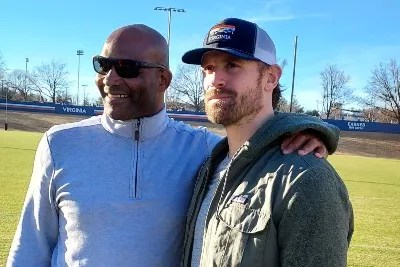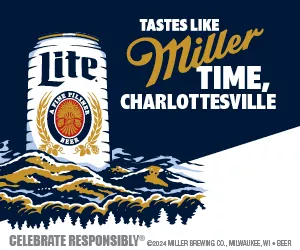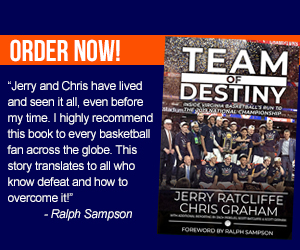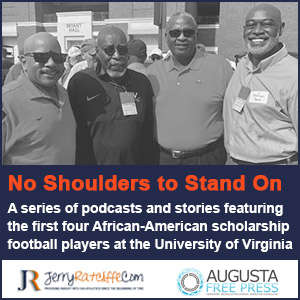Slade returns to help put UVA back on the map
By Jerry Ratcliffe
Chris Slade looked out on the practice fields and remembered the daily wars between him and Ray Roberts back in the George Welsh era of Virginia football. The two All-Americans and future pro standouts would sometimes go after each other so hard that Welsh would have to blow the bullhorn for them to stop.
As iron sharpened iron, the two stars forged an everlasting friendship, a brotherhood that can never be broken. Roberts even named his oldest son Slade in his former teammate’s honor.
While Wahoo Nation was thrilled that Chris Slade returned to his alma mater at new head coach Tony Elliott’s beckoning, no one was more excited about the move than Roberts.
“There’s a greatness that has come from this program,” Roberts said from his home outside Seattle in a recent podcast on this website (you can listen to the entire podcast here). “Not goodness, but greatness. Chris Slade is a walking example of the greatness that can come from UVA.
“That’s why I think it’s important for him to take the job, because I’m sure in the past [Virginia] may have reached out to players that maybe didn’t have interest, but Chris Slade said, ‘yeah, this is important enough for me to come back and coach and help bring this program back to prominence.’
“I think that sends a message to the players, so now you have a dude who has walked those McCue Center halls, went into those same rooms, went to the weight room. I think it’s awesome that [UVA] had the foresight to [bring him back].”
The duo starred for Welsh in the late 1980s and early 1990s, were key parts of some of the program’s best teams, and went on to successful NFL careers. Slade wants UVA to return to that glory, and Roberts is rooting for that to happen from afar.
“I had to really think about, am I coming back to UVA just because it’s comfortable and that I know the school and do I want to coach football?” Slade said about his return. “I didn’t come back because of that. I came back because I felt like this is the right time, and Tony would be a great guy to work with and work for. I’m excited about being back.”
Both Roberts and Slade were part of Virginia’s 1989 team, the only team in Cavalier history that won 10 games.
“That was my freshman year, and I think it’s absurd with all the players we’ve had come through this program,” Slade said. “That kind of stuff, I take personal and I want to be a part of something special. I want to be a part of getting back here and getting us to that next level to where we’re consistently embarking on a possible 10-win season or more than 10 wins.
“So I’m back for a couple of reasons. One is, I want to compete, I want us to win. And I want to just continue to help young men flourish and get to their next goals. Help them prepare as mature young men and go to the NFL.”
Following that 1989 campaign, Welsh led Virginia to three 9-win seasons (1994, 1995 and 1998). Successor Al Groh posted two 9-win seasons (2002 and 2007) and Bronco Mendenhall’s Orange Bowl season was a 9-win season in 2019, even though that team lost to Elliott’s Clemson team in the ACC Championship and to a top-10 Florida team in the bowl.
Slade pointed out that recruiting, particularly within the state’s borders, must improve (more on that in a future story). Elliott needed Slade’s presence on this staff, not only to help recruiting (Slade hailed from the talent-rich 757), but teaching the defensive end/outside linebacker position where the former Tabb High School star was so imposing. Slade still holds the ACC record for most career quarterback sacks.
When Elliott was at Clemson, he tried to recruit some of Slade’s prospects at Pace Academy, a private high school in Atlanta. They developed a relationship, and when Elliott took the UVA job, he quizzed Slade about former players that might fit in the program.
“He was asking me questions and I never thought about it, because I didn’t think about the possibility [of returning],” Slade said. “He said he wanted to use me in some capacity to help figure out [UVA’s program].”
Elliott wasn’t sure if Slade wanted to coach, be a player-personnel-type guy or some other role, but he left no doubt he wanted Slade. In fact, in a recent interview, Elliott said he struck out on recruiting two of Slade’s players at Pace, so he didn’t want to go 0 for 3.
“[Elliott] called me up a week or two later, and he’s like, ‘Hey, I want to offer you a job,’ so our conversations intensified,” Slade said. “He wanted my advice on UVA and the culture and did I think he’d be a good fit, would the alumni players embrace him, how did I see him fitting in Charlottesville.”
From that point, Slade was interested in returning and was soon named to Elliott’s coaching staff.
Part of Slade’s tasks under new defensive coordinator John Rudzinski will be to rebuild a defense that finished as one of the statistically worst units in Power-5 football last season. Slade, who was a three-time All-ACC defender knows why.
“When I watched us play the last few years, we had no guys that can make plays,” Slade said. “We’ve always had a defensive lineman or somebody in the front seven that can change the complexity of the game in one play. I haven’t seen that in years.
“We’ve got to get bigger up front. Obviously, everybody is looking for length and size, especially on the edges. I tell you, Coach Rud is going to be great for our defense. He has a lot of good stuff. He did a great job with those guys at Air Force and they always played hard. But we’ve got to get guys, I don’t care who we’ve got on the sideline coaching, you’ve got to have players.”
Players like Roberts and Slade and their teammates from their great teams. Roberts remembers.
“Practing against [Chris], you just had to be ready for everything,” Roberts said. “He had long arms, he’s a strong dude, he could rush for power, he could rush for speed, yet he could use his hands really well. I would say other than Chris, in practice, the best college player I played against was Marco Coleman at Georgia Tech, who was also drafted in the first round.”
Roberts said that Coleman had more quickness than power, even though he also had size. But going against Slade every day, he knew that no one was going to threaten him as a left tackle more than his own teammate.
“Being able to practice against that every day, it couldn’t do anything but help,” Roberts said.
Once Slade arrived back in Charlottesville, he spent a lot of time on the road because it was a live-recruiting period and he knew that Virginia had a lot of ground to cover in a short window. A hectic schedule doesn’t even begin to describe his non-stop weeks.
He visited California and Atlanta with Elliott, plus the Tidewater.
“We did a 24-hour California trip, so it has been crazy busy,” Slade said. “I’ve fallen asleep more times with the TV watching me, rather than me watching TV, at night. But it’s been fun, learning a lot as I go.”
He’s had a lot of travel time to get to know Elliott even better. Elliott was glad that he managed to get Slade out of Pace after missing on Andrew Thomas, who went to Georgia and was the fourth pick of the draft by the Giants, and Jamari Sawyer, who ended up starting at left tackle for Georgia’s recent national-championship team.
Elliott earned Slade’s respect a long time ago while he was co-offensive coordinator at Clemson. Slade pointed out that the day the Tigers defeated Alabama for the national title, the very next morning at 7:45, Elliott showed up at Slade’s school to recruit.
“You know, sometimes these [college] coaches get too big for their britches and they don’t remember the high-school coaches, don’t remember people who helped them,” Slade said. “I’ve seen [Elliott] come up through the ranks and he’s the same guy now that I’m working for.”
Even with the bonding they’ve done on the road, Elliott revealed in a recent interview that he’s finding out what assistant coaches want to maintain a strict schedule, which ones don’t mind to stop and eat (often), which ones bring him biscuits and warm up the car on chilly mornings, and which ones he trusts to drive.
Elliott quickly pointed out that when he’s in a car trip with Slade, “I’m driving,” the head coach said.
Slade knows why.
“I’m pretty sure he’s referring to a late night in Virginia Beach, going over one of those overpasses, and I kind of got, well, I went out of the lane a little bit,” Slade said. “The boss had me driving for like six or seven hours that day and I was a little tired and I kind of went off a little bit, woke him up and french fries went flying, but we made it to the waterfront okay.”
While Elliott took his friendly jab at Slade, turnabout was fair play. What did Slade learn about his boss as a travel companion?
“That dude, he likes to eat,” Slade said. “Tony likes to eat and he doesn’t mind stopping to eat. He’s a talker, too. I thought I could talk. Tony can talk.
“Some coaches walk around and they let you know you’re the assistant and that they’re the head coach, because they tell you that and have an aire about them. Not Tony. At the end of the day, obviously, he’s going to make all the final decisions and we know who’s in charge. But he’s humble.”
Elliott was humble on that California trip, but he did let Slade know who was in charge when it came to driving.
“He would not let me drive,” Slade said. “He’s like, I’m gonna drive. You talk to your kids on the phone or something.”
Seems as if Elliott didn’t want fries flying all over the car again.










